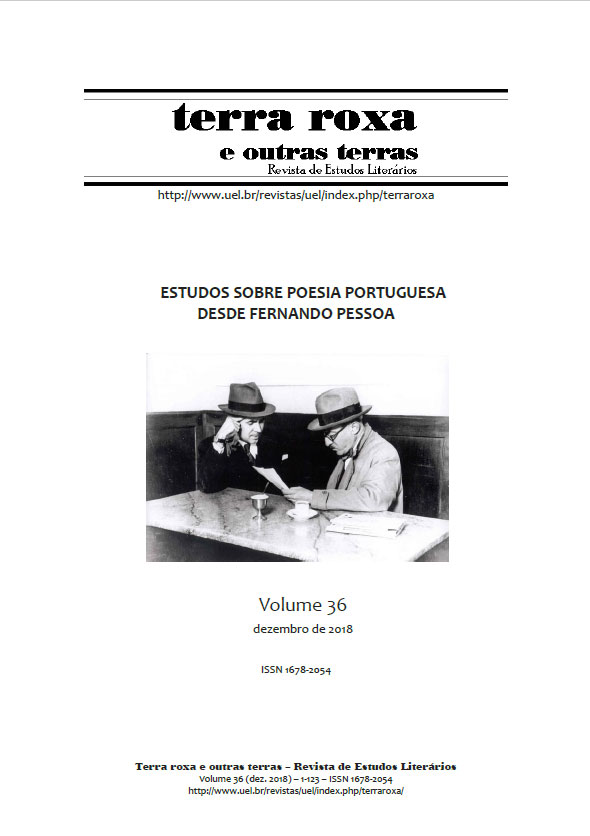Photomaton & Vox: the construction of Herberto Helder’s poetics
DOI:
https://doi.org/10.5433/1678-2054.2018v36p112Keywords:
Herberto Helder, Contemporary Portuguese poetry, Poetics.Abstract
Herberto Helder is one of the most important Portuguese poets of the second half of the XX century and XXI century. His poetry marked by silence, body and metaphors about his own poetic making became recognized by his contemporaries and future generations of writers of prose and poetry. Published in 1979, for the first time, Photomaton & Vox, is a work that aligns fragments of essays texts and poems. Composed of comments, memorialistic and aesthetic experiences, the book has become a form of “hebertian” poetics, where we find different aspects that guide its writing. This paper uses singular essayists on the poet and on the poetic genre to analyze excerpts from Photomaton & Vox perceiving the characteristics that promote it as poetic and the importance of Herberto Helder for Portuguese poetry after Fernando Pessoa.Downloads
References
CORREIA, Natália.O surrealismo na poesia portuguesa. Lisboa: Europa-América, 2002.
CRUZ, Gastão. A poesia portuguesa hoje. Lisboa: Plátano, 1973.
DAL FARRA, Maria Lúcia. A alquimia da linguagem – leitura da cosmogonia poética de Herberto Helder. Lisboa: Imprensa Nacional, 1986.
DIAS, Sousa. O que é poesia? Lisboa: Documenta/Sistema Solar, 2014.
DUFRENNE, Mikel. O poético. Trad. Luiz Arthur Nunes e Reasylvia Kroeff de Souza. Porto Alegre: Globo, 1969.
GUIMARÃES, Fernando. Revisão da moderna poesia portuguesa Revista Colóquio/Letras (Lisboa), n. 1, pp. 34-44, mar. 1971. Disponível em http://coloquio.gulbenkian.pt/bib/sirius.exe/issueContentDisplay?n=1&p=34&o=p.
GUSMÃO, Manuel. Tatuagem e palimpsesto – da poesia em alguns poetas e poemas. Lisboa: Assírio e Alvim, 2010.
HATHERLY, Ana & Ernesto Manuel de Melo e Castro. PO.EX: Textos Teóricos e Documentos da Poesia Experimental Portuguesa. Lisboa: Moraes, 1981.
HELDER, Herberto. Photomaton & Vox. Rio de Janeiro: Tinta-da-China Brasil, 2017.
LEAL, Izabela. Coisas que aprendi com Herberto Helder. Poetas que interessam mais: leituras da poesia pós-Fernando Pessoa. Ida Alves & Luis Maffei (orgs.). Rio de Janeiro: Beco do Azougue, 2011, pp. 169-179.
MARTELO, Rosa Maria. Os nomes da obra Herberto Helder ou o poema contínuo. Lisboa: Documenta/Sistema Solar, 2016.
MARTINS, Manuel Frias. Um outro olhar sobre a condição hebertiana de «levar a linguagem à carnificina». Catherine Dumas et al. (orgs). Herberto Helder, Se eu quisesse enlouquecia. Rio de Janeiro: Oficina Raquel, 2015, pp. 231-250.
MOURÃO, José Augusto, A arte poética de Sophia de Mello Breyner Andresen (do elogio da ascese e da nostalgia do signo). Poética do século XX. Lisboa: Horizonte, 1984, pp. 205-214.
PAZ, Octavio. O arco e a lira. Trad. Ari Roitman e Paulina Wacht. São Paulo: Cosac Naify, 2012.
POUND, Ezra. A arte da poesia. Trad. Heloysa de Lima Dantas e José Paulo Paes. São Paulo: Cultrix, 1976.
RODRIGUES, Angela Varela. O poema em prosa na literatura portuguesa.In.: Revista Colóquio/Letras (Lisboa), n. 56, pp. 23-34, jul. 1980. Disponível em http://coloquio.gulbenkian.pt/bib/sirius.exe/issueContentDisplay?n=56&p=23&o=r-.
RISO, Carla. auto-bio-thanato-grafia: a experiência do silêncio em Photomaton & Vox, de Herberto Helder. SCRIPTA (Belo Horizonte), v. 8, n. 15, pp. 46-59, 2º sem. 2004. Disponível em http://200.229.32.55/index.php/scripta/article/view/12567/9869.
SENA, Jorge de. Da poesia portuguesa. Lisboa: Ática, 1959.
Downloads
Published
How to Cite
Issue
Section
License
Authors who publish in this journal agree to the following terms:
a) The authors retain the copyright and grant the journal the right of first publication, the work being simultaneously licensed under the Creative Commons Attribution-NonCommercial 4.0 International License, allowing the sharing of the work with acknowledgment of the authorship of the work and initial publication in this journal.
b) Authors are authorized to assume additional contracts separately, for non-exclusive distribution of the version of the work published in this journal (eg, publish in an institutional repository or as a book chapter), with acknowledgment of authorship and initial publication in this journal.
c) Authors are allowed and encouraged to publish and distribute their work online (e.g. in institutional repositories or on their personal page) after the editorial process, as this can generate productive changes as well as increase impact and citation of the published work (See The Effect of Open Access).
d) The authors of the approved works authorize the journal to, after publication, transfer their content for reproduction in content indexers, virtual libraries and the like.
e) The authors assume that the texts submitted for publication are of their original creation, taking full responsibility for their content in case of any objection by third parties.



















